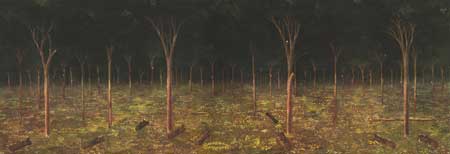When America Sneezes…
Amidst current fears over the avian influenza pandemic, the protection of human life and the protection of Intellectual Property (IP) is hanging in the balance. In the event of a global emergency, nations who have signed the WTO’s draconian TRIPS agreement would not be able to afford to buy enough of the patented flu vaccine – Roche’s Tamiflu – to protect their populations. They would then be forced to issue compulsory licences allowing them to produce the drug en masse without consent from the patent holder. Were this to happen, it would represent a rare and temporary moment of leniency in the relentless programme of enclosures currently being erected around ideas and intellectual ‘goods’ within the knowledge economy.
Whatever one thinks of the geopolitics of the avian flu scare (convenient source of distraction in the midst of current account deficits and foreign misadventures?; anti-Chinese and anti-immigrant propaganda?), it would seem to take the threat of mega-deaths in the first world to dent the regime of enclosures. As their manufacturing dwindles to an all time low and the Asian tigers threaten to become, in the words of Tessa Jowell, ‘larger exporter[s] than Europe’, the US, UK and other ‘post-industrial’ economies are placing a desperate faith in IP protection and the ability for creativity to ‘add value’.
In defiance of this latter day regime of enclosures, a struggle is ensuing to produce and protect what is being called the Knowledge Commons. The idea is that, as with the pre-capitalist common lands on which the majority of people subsisted, we can build a resource, a life source, of intellectual wealth to sustain people within informatic capitalism. Promoting digital abundance and the spectre of sharing, the cyber-commoners range from libertarian capitalists promoting innovation with some rights reserved, to class struggle anarchists seeking an abolition of property without reserve. All agree that the knowledge commons must be extended and defended.
But this endeavour is not without problems, political, tactical and philosophical. In this first issue of the new format Mute, we have tried to foreground the antagonisms which the Knowledge Commons throw up: How does the ideal of voluntary collaborative production, exemplified by Free/Libre Open Source Software (FLOSS), connect to the incorporation of ‘free labour’ within post-fordist production (see our FLOSS producer’s questionnaire, p.10)? How does the logic of copyleft, which turns copyright licensing on its head and which is widely used to protect the Knowledge Commons from commercial enclosure, tackle the Law’s inherent violence and arbitrariness (see Martin Hardie, p.54)? How do commons in their ‘immaterial’ informatic form relate to the material struggles of the world’s soil-tilling majority, and are knowledge workers really the vanguard of anti-capitalism (answers can be gleaned from texts by Steve Wright, p.34, and Peter Linebaugh, p.72)? What kind of an economic resource is intellectual wealth, and does the focus on a free and fertile Knowledge Commons ultimately mirror the unqualified faith placed in the knowledge economy’s ability to produce value (Steve Wright again, and Soenke Zehle, p.22)? These questions build critically on Mute’s earlier investigation of the ‘digital commons’ in 2002 – Vol 1, issue 20.
To ‘produce’ the working class, argues Peter Linebaugh, use-value had to be eclipsed by exchange-value and the agrarian commons bulldozed to smooth the passage of global trade. Perhaps today, the fight to defend the mutating contemporary commons in all its forms (from natural resources to indigenous knowledges) is producing a new mutant global class whose solidarities cross social strata: ‘strange loopsC9 odd circuits and strange connections between and among various class sectors’ – as Midnight Notes once put it (Steve Wright, p.34). We may live to see these loops intensify, if we survive the bird flu that is.

Image>Per Wize
Mute Books Orders
For Mute Books distribution contact Anagram Books
contact@anagrambooks.com
For online purchases visit anagrambooks.com






